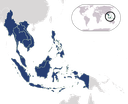Research Projects: Modes of world-making in Southeast Asia
- Contents
- Ideas of the "Arab World" in Indonesia - Perceptions and Experiences of Working Migrants and Pilgrims
- Between Threat and Opportunity - The Image of US Foreign Policy in the Indonesian Press
- The Knowledge of the "West" in Contemporary Indonesia: Anthropological Research in Rural and Urban Spaces on Java and Sulawesi
- Constructions of the West through International Relations Scholars: Indonesian Views
- China and the Political Economy: East Asian Financial Order
- The 'West' from the view of Chinese Diaspora: Entrepreneurship in Indonesia
Ideas of the "Arab World" in Indonesia - Perceptions and Experiences of Working Migrants and Pilgrims
| Researcher: | Dr. Mirjam Lücking |
| Department: | Institute of Cultural and Social Anthropology |
| Duration: | First Explorative Fieldwork Period (funded by BMBF): 2015 - 2017 |
The Knowledge and the perceptions of “the world” are integral parts of societal ideas of morality and influence societal change. Ideas of the Arab World seem to a crucial reference point in Indonesia. The research interest is inspired by findings of the research project “Beyond Occidentalism: Concepts of the `West´ in Asia”. As the previous research activities of the Freiburg BMBF funded projects have shown, the South-South-Exchange becomes increasingly meaningful in globalized networks. What role do ideas and images of the “Arab World” in Indonesia play in this context?
Saudi Arabia is regarded as “holy land” for Muslims. The pilgrimage to Mecca is central in many Muslims life. Waiting lists to join the hajj (pilgrimage) are long in Indonesia. In order to meet the increasing demand, travel agencies offer additional trips to the “Arab World”. The agencies often advertise that travelers would get the chance to do the small pilgrimage (umrah) and explore other holy places in the Middle East.
Besides the positive connotations with the “Arab World” being the centre of Islam, the experiences of other mobile groups create a different picture of the region. Indonesian working migrants (mainly domestic workers) experience the “Arab World” in private households in Saudi Arabia, Oman, Kuwait and the United Arab Emirates. Reports about ill-treatment of domestic workers and human rights violations evoke a more critical view of the respective Arabic countries. Especially non-governmental organizations and journalists work on the disclosure of the situation.
Questions of the project that is still in the conceptualization process are: How important is the “Arab World” as a reference point for ideas of the world and of morality in Indonesia? What meaning do experiences in the Middle East carry for general worldviews in Indonesia? What kind of knowledge do pilgrims and working migrants bring along from their journeys and which ideas are revised? What is the relationship of the different experiences of pilgrims and migrants?
Contention with the different mobile groups that interact with the “Arab World” discloses which ideas and which knowledge about the “Arab World” exist in Indonesia and which identifications result from these ideas and what impact this eventually has on the Indonesian society.
Between Threat and Opportunity - The Image of US Foreign Policy in the Indonesian Press
| PhD Candidate: | Jarno S. Lang |
| Department: | Department of Political Science, University of Freiburg |
| Funding: | Cusanuswerk |
| Duration: | 2012 - 2015 |
From the Konfrontasi period over the Reformasi Movement in the late 1990s to the open questions of Southeast Asian regionalism of the new millennium, ever since the country’s independence, the USA has either been important as a partner or an adversary to Indonesia. The beginning 21st century saw the rise of country specific, but also common challenges. On the domestic level, the economically ever stronger getting Indonesia has developed a democratic system, while the ascendance of neighboring India and especially China dominate the regional agenda. On the American side the Obama Administration has left no doubt that it views Indonesia as a very important economic and strategic partner in Southeast Asia. It will thus be of great relevance how Indonesia in the light of this international setting reacts to American advances and behavior, in other words, how Indonesia perceives the USA.
One force that is able to very strongly influence this perception is the media, as by deciding what news is important and how to depict it, they affect public opinion. For decades, the Indonesian media have been involved in major social and political events. Nonetheless, with the end of Suharto’s authoritarian New Order system that lasted for more than three decades, the rules of the game changed. Democratization demanded that not only the state, but also civil society should change. As the media of the Suharto era have often been referred to as the former system’s “lapdog”, in 21st century Indonesia they face the huge challenge of being profitable while simultaneously reaching professional journalistic standards.
Thus taking into account the importance of the Indonesian-American relations and the relevance the media have in Indonesian society, this study seeks to analyze first how the Indonesian media have depicted US foreign policy in the decade from 2001 to 2011, and second how these images might differ from official statements, in order to evaluate the image of the USA in the Indonesian media and to draw assumptions on the state of the media in Indonesia. Qualitative methods such as discourse analysis and semi-open expert interviews that will be supplemented by surveys, present the means through which the necessary data will be gathered.
Publication:
- Lang, Jarno S. (2016). Foreign Policy and the Media. The US in the Eyes of the Indonesian Press. Basingstoke: Palgrave Macmillan.
The Knowledge of the "West" in Contemporary Indonesia: Anthropological Research in Rural and Urban Spaces on Java and Sulawesi
| Project Director: | Prof. Dr. Judith Schlehe |
| Principle Researcher: | Melanie V. Nertz, M.A. |
| Associate Researcher: | Vissia Ita Yulianto, M.A. (DAAD, BMBF) |
| Department: | Institute of Cultural and Social Anthropology |
| Funding: |
Research Project funded by DFG within the research group "Beyond Occidentalism. |
| Duration: |
15 December 2009 -14 December 2012 |
| Related PhD Projects: |
“Occidentalisms in a Globalizing World: Negotiating ‘Western’ and ‘Islamic’ Frames of Reference on Java and Sulawesi, Indonesia” (Melanie V. Nertz, M.A.) “Reframing Modernity in Contemporary Indonesia; an Ethnographic Study of Center and Periphery of Manado, North Sulawesi” (Vissia Ita Yulianto, M.A.) |
The political change after 1998 and the increasing influence of religion in Indonesia have lead to a cultural vicissitude, beyond which we cannot see what future patterns of orientation the population will have. Part of this is the repositioning of the “Self” in opposition to the “Other” and the “Foreign.” The local knowledge of the West – i.e. the understanding, interpretation and assessment thereof – is combined in a variety of manners with the conceptualizations from Asia, the Arabic world and the world in its entirety. The goal of the project is to record in detail the ways in which the “West” serves as a point of reference by which modernization, globalization, values and moral beliefs, religious identifications, gender constructs, patterns of consumption and personal ways of life are negotiated and transformed into actions.
The ethnological project pursues this empirical study in three culturally varied regions of Indonesia to address the question of how firsthand experience in the West and direct encounters with “Westerners” along with knowledge of the “West” from other sources are connected with discursive practices shaped by local culture. Which images of the “West” become apparent, how are they propagated and how are they realized? The intended regions of study are 1) North Sulawesi (Manado), a Christian region with a pro-Dutch tradition; 2) South Sulawesi (Makassar), where strong tendencies of Islamization are currently to be documented; 3) Yogyakarta, as a centre of culture and education.
Publication:
- Yulianto, Ita Vissia (2017): Reframing Modernities in Contemporary Indonesia: An Ethnographic Study of Ideas of Center and Periphery on Sulawesi and Java, Berlin: Regiospectra-Verlag.
Constructions of the West through International Relations Scholars: Indonesian Views
|
Project Director:
|
|
|
Principle Researcher:
|
Dr. Parudee Nguitragool
|
|
Department:
|
|
|
Funding:
|
Research project funded by DFG within the research group "Beyond Occidentalism. Concepts of the 'West' in Asia" |
| Duration: | 1 October 2009 – 30 September 2012 |
Improving the relations between Asia and the West to find a common ground with respect to norms facilitating international cooperation is paramount in the search for solutions to global problems such as economic crises, environmental degradation, irregular migration, pandemics, international terrorism, organized transnational crime, piracy and drug trafficking. While globalization is often demonized as an essentially destructive force, it indeed entails a number of opportunities. One is the prospect for reviewing and eventually discarding long held stereotypes and misperceptions between social actors (be it global regions, nation states or ethnic groups) through more and accelerated communication, higher levels of information and intensified social exchange that allow for the transmission of ideas, norms and values with a possible effect of challenging the cognitive status quo. Whether this is the case in the relations between Asia and the West is to be explored in the project focusing on Indonesia.
Relying on a combination of qualitative methods, including process tracing, and content analysis, this research project seeks to explore the impact of social interaction of Indonesian International Relations scholars, who have been exposed to international norms and Western foreign policy ideas through overseas education and direct contact with Western peers. Of particular interest is the extent to which these scholars have contributed to 1) the construction of the images of the West, and 2) the understanding of international relations, such as international cooperation. Nguitragool, Paruedee (2013). Indonesia, the West and International Politics: A Survey of Indonesian Student Perceptions of Self and Others in International Relations. Occasional Paper 18. Southeast Asian Studies at the University of Freiburg.
Publications:
- Nguitragool, Paruedee (2012). God-King and Indonesia: Renegotiating the Boundaries between Western and Non-Western Perspectives on Foreign Policy. Pacific Affairs 85 (4), 723-743.
- Nguitragool, Paruedee (2013). Indonesia, the West and International Politics: A Survey of Indonesian Student Perceptions of Self and Others in International Relations. Southeast Asian Studies at the University of Freiburg. Occasional Paper 18.
China and the Political Economy: East Asian Financial Order
| PhD candidate: | Mikko Huotari |
| Department: | Department of Political Science, University of Freiburg |
| Funding: | BMBF |
The 'West' from the view of Chinese Diaspora: Entrepreneurship in Indonesia
| Project Director: | Prof. Dr. Sabine Dabringhaus |
| Associate Researcher: | Agni Malagina |
| Department: | Department of Asian History |
|
Funding: |
Research Project funded by DFG within the research group "Beyond Occidentalism. Concepts of the 'West' in Asia" |
| Duration: | 15 December 2009-14 December 2012 |
Chinese transnationalism nowadays depicts one important part of Chinese Diaspora Studies, which examine Chinese migration across the world from an economic, sociological, ethnographical and historical perspective. In many cases, overseas ethnic Chinese acquired a cultural knowledge of ‘the West’ much earlier than the majority of the indigenous population, especially in Indonesia, and have hence played their part in shaping the face of Southeast Asia and local perceptions of ‘the West’ alike. Since the Dutch Colonial period, ethnic Chinese entrepreneurs in Indonesia have operated as intermediary agents, who facilitated local and cross regional commerce through their extensive trade networks and functioned as a gateway to the culturally close ‘East’ as well as the geographically distant ‘West’ at the same time.
The main focus of research aims at examining how the position of Chinese-Indonesians in colonial times has influenced contemporary attitudes of ethnic Chinese towards the West (and towards China/the world)?
Through a combination of qualitative methods, including interviews and discourse analysis, this research project will analyze how these images of the ‘West’ perceived by Chinese-Indonesian entrepreneurs from the colonial period to the present day have changed over time. The research area includes the following regions: 1) Jakarta – early contact with the Dutch Colonial Government, 2) West Borneo – Ethnic Chinese and Missionaries, 3) Atambua – administratively related to the Dutch and culturally related to Portuguese.









